On a sunny afternoon at the dog park, amidst the usual chorus of barks and the flurry of tails, one dog stood out distinctly. It was a Husky Poodle Mix, also known as a Huskypoo. It is also known as the Siberpoo, Huskypoo, and Huskydoodle.
At first glance, you might mistake it for a fluffy Siberian Husky or a particularly robust Poodle, but the Huskypoo is a unique blend of both. With the alert, ice-blue eyes of a Husky and the soft, curly coat of a Poodle, this dog was a striking sight. This mix results in a dog that’s both a clever companion and a playful pet, capable of adapting to various lifestyles and family settings.
But before anything else, take note of one thing – the Huskypoo can be a very demanding dog, especially in terms of its care requirements. As such, I do not recommend this to first-time dog owners or those who cannot commit to their pet’s needs.
As we explore the world of the Huskypoo, you’ll discover why this breed isn’t just a visual delight, but also a wonderful addition to a variety of homes. Their combination of intelligence, energy, and adaptability makes them a fascinating subject and a delightful companion.
TABLE OF CONTENTS
- Husky Poodle Mix Quick Breed Summary
- Origin of the Husky Poodle Mix
- Husky Poodle Mix Appearance
- Personality and Temperament of the Husky Poo
- Caring for a Husky Poodle Mix
- Understanding Health Challenges in Husky Poodle Mixes
- How to Train a Husky Poodle Mix
- The Cost of Owning a Husky Poodle Mix
- FAQs on Husky Poodle Mixes
- So, Is The Husky Poodle Mix the Right Dog For You?
- More Siberian Husky and Poodle Mixes
Husky Poodle Mix Quick Breed Summary
| Size | 13-22 inches |
| Weight | 45-60 pounds |
| Lifespan | 10-13 years |
| Coat | Thick double coat, wavy |
| Color | Black, white, grey, or brown |
| Shedding Tendency | Yes |
| Temperament | Bold, engaging, intelligent, and clingy |
| Intelligence | High |
| Socialization | Needs to learn how to socialize with others |
| Destructive Behavior | Destructive and aggressive when neglected |
| People Skills | Generally friendly but can be pushy and arrogant |
| Good with Children | Not with young children |
| Activity Levels | High |
Origin of the Husky Poodle Mix
In the latter part of the 20th century, the dog breeding world witnessed the birth of a new hybrid, the Husky Poodle Mix. This breed, emerging in the dynamic landscape of North American dog breeding, represents a captivating blend of two highly esteemed breeds. The introduction of this crossbreed dog was intended to create a dog that combined the Siberian Husky’s rugged charm with the Poodle’s renowned intelligence.
A Look at the Parent Breeds
Siberian Husky: The Resilient Northern Breed
The Siberian Husky, a breed forged in the harsh climates of Northeast Asia, is celebrated for its endurance and striking wolf-like features. My experiences with Huskies have always left me in awe of their robust energy and amiable demeanor, a testament to their sled-pulling heritage.
Poodle: The Elegant and Brainy Companion
The Poodle, originating in Germany and later becoming a symbol of elegance in France, stands out for its sharp intellect and agile nature. Historically bred for water retrieving, their hypoallergenic coat and graceful posture have made them a favorite among dog aficionados. The Poodle’s blend of intelligence and aesthetic appeal is a key factor in its enduring popularity.
The Emergence of the Huskypoo
The Husky Poodle Mix was conceived to meld the Husky’s adventurous spirit and eye-catching looks with the Poodle’s hypoallergenic coat and cognitive prowess. This breeding initiative highlights the creativity and foresight of dog breeders in striving to develop a dog that not only adapts well to various environments but also exhibits a balanced blend of physical and mental attributes.
The Huskypoo’s Niche in the World of Designer Dogs
Amidst the growing trend of designer dog breeding, the Huskypoo stands out for its unique combination of characteristics inherited from its parent breeds.
Although it lacks official recognition from major kennel clubs like the American Kennel Club, the Huskypoo has earned a special place in the realm of dog lovers. The breed’s distinct mix of its parents’ best qualities has made it an appealing choice for those in search of a unique, engaging, and versatile canine companion.
Husky Poodle Mix Appearance
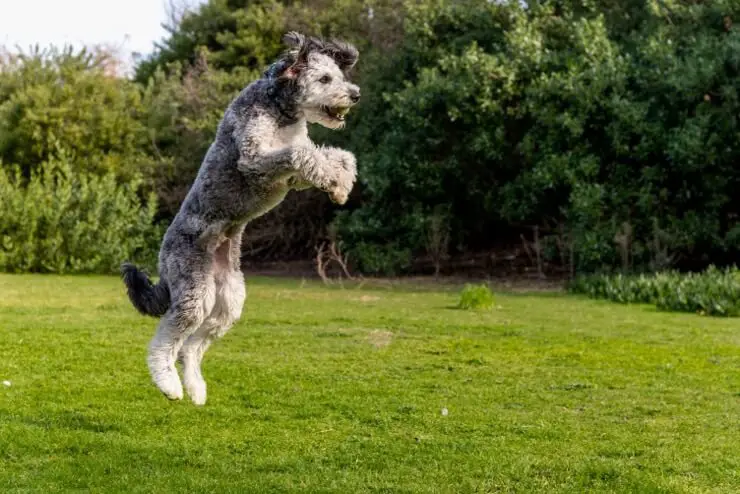
From Adobe Stock
Every time I encounter a Husky Poodle Mix, I’m struck by the breed’s unique aesthetic, a vivid tapestry woven from the distinct physical characteristics of its parent breeds. The Husky Doodle is not just a dog; it’s a living piece of art, blending the best physical features of the Siberian Husky and the Poodle.
Size and Weight: The Perfect Medium
Their size and weight offer a perfect balance, appealing to those who prefer neither too large nor too small a dog. Typically, a Huskypoo will weigh between 45 to 60 pounds, fitting comfortably into the medium to large dog category.
Their height ranges from 13 to 22 inches at the shoulder, embodying a stature that combines the sturdiness of the Husky with the Poodle’s grace.
Coat and Colors: A Rich Palette
The coat of a Huskypoo is where the magic of this hybrid shines. It can range from the thick, double-coat characteristic of the Husky to the Poodle’s distinctive, hypoallergenic curls.
The texture varies, sometimes wavy, other times more tightly curled, making each Huskipoo a unique display of hybrid beauty.
As for colors, they span a wide spectrum, including black, white, gray, brown, and the enchanting silver-blue reminiscent of the Husky lineage.
Eyes: Windows to a Mixed Heritage
The eyes of a Huskypoo are particularly enchanting. Many inherit the striking blue or even heterochromatic eyes of their Husky ancestors, which never fail to capture attention. Others might showcase the deep, soulful eyes typical of a Poodle, reflecting intelligence and depth.
Ears and Tail: The Subtle Telltales
Huskypoos often inherit the erect, triangular ears of the Husky, giving them an alert and curious expression. Their tails, too, can vary, ranging from the Poodle’s elegantly curled to the Husky’s bushy, sweeping tail. These features add to the overall allure of the breed, marking them as truly distinctive in the canine world.
Personality and Temperament of the Husky Poo
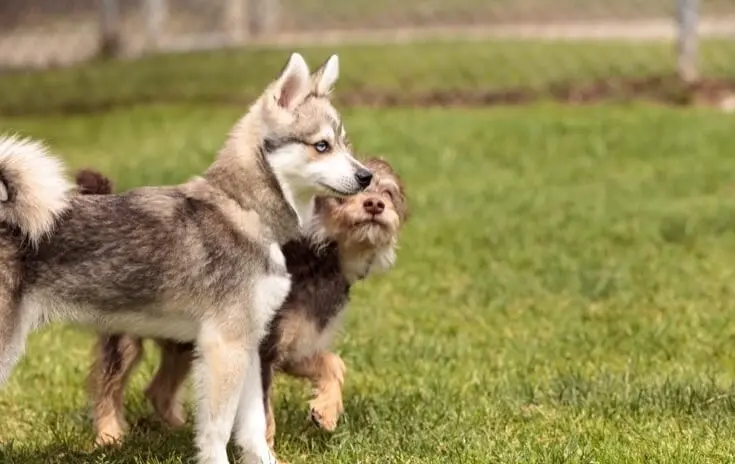
From Adobe Stock
This unique blend of the Siberian Husky and Poodle brings together a dynamic range of traits, resulting in a temperament that is both delightful and challenging.
Intelligence and Trainability
Imagine a dog that’s not just a pet but a quick-witted companion, eager to learn and impress. That’s the Husky Doodle for you.
Their ability to grasp commands and tricks swiftly is remarkable, a trait I’ve marveled at time and again. But remember, with great brains come great needs for mental engagement. These dogs crave challenges and activities that stimulate their minds, or else they might resort to a bit of playful troublemaking.
Their intelligence means they can pick up on both good and bad habits quickly, so early training and socialization are key. The joy of working with a Huskypoo in training sessions is unparalleled, as they bring not only their smarts but also an enthusiastic energy to the process.
Sociability and Affection
These dogs don’t just walk into a room; they own it with their charismatic presence.
They have a way of making friends with both humans and other animals, often becoming the beloved heart of the family. Their affectionate nature shines brightest when they’re involved in family activities, showing a level of empathy and connection that’s truly heartwarming.
However, the Husky Poo’s sociability doesn’t just stop at being friendly. They form deep, loyal bonds with their owners, often becoming protective and caring family members. They cherish quality time, be it playing in the yard or snuggling up for a cozy evening. This blend of friendliness and loyalty makes the Huskypoo a companion that fills homes with love and laughter.
Energy and Playfulness
Energy is the Husky Poo’s middle name.
These dogs are the epitome of vitality, bringing a lively spirit to every day. Their need for regular exercise is not just a preference; it’s a necessity. From brisk walks to playful fetch sessions, the Husky Doodle is always up for an adventure. Their zest for life is contagious, making them perfect companions for active individuals or families.
But it’s not all about physical exercise. The Husky Poo’s playfulness extends to their love for games and mental stimulation. They enjoy interactive toys, puzzle games, and anything that keeps them engaged and entertained. This playful nature is not just fun; it’s a vital part of keeping them happy and healthy, both physically and mentally.
Independence vs. Loyalty
Navigating the Husky Poo’s personality is like walking a tightrope between independence and loyalty.
They have inherited the Husky’s independent spirit, which can sometimes translate into a bit of stubbornness. But this is balanced beautifully by the Poodle’s unwavering loyalty. It’s a fascinating mix that requires patience and understanding from the owner.
This duality in their temperament means they need an owner who respects their independence while nurturing their loyal side. It’s about finding the right balance in training and bonding, ensuring that the Husky Poodle Mix feels both free and connected within the family dynamic.
Adaptability
Lastly, the Husky Poo’s adaptability is a trait that deserves a spotlight.
They have a chameleon-like ability to adjust to various living environments, making them suitable for diverse lifestyles. Whether in a spacious suburban home or a cozy city apartment, the Huskypoo can thrive if its physical and mental needs are met.
Their adaptability also shines in their ability to gel with different family types. From singles to large families, the Siberpoo can find its place and thrive. This versatility is a hallmark of the breed, making it an appealing choice for a wide range of potential dog owners.
Caring for a Husky Poodle Mix
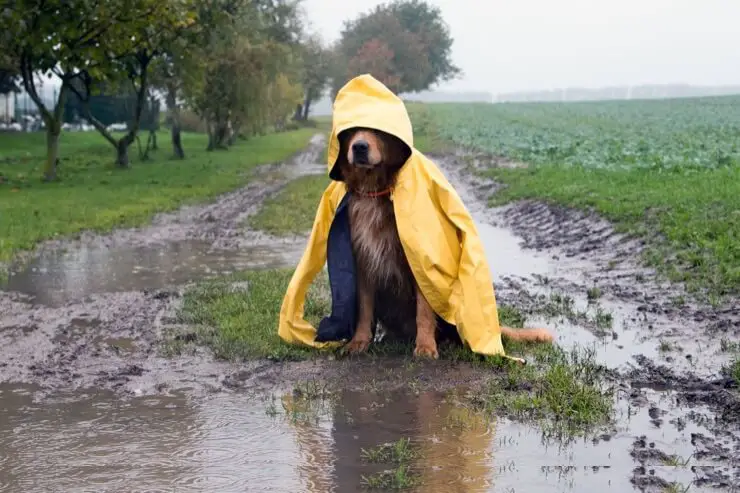
From Adobe Stock
Owning a Husky Poodle Mix is a delightful but demanding experience. Proper care for these dynamic dogs involves a mix of exercise, grooming, and nutrition. Let’s explore what it takes to keep a Huskypoo in top shape.
Exercise Requirements: Keeping Up with Their Energy
The Huskydoodle is an energetic blend of vigor and vitality. They require regular, consistent exercise to maintain their physical and mental health.
In my time with these dogs, I’ve found that a combination of activities works best. A daily routine should include walks – long and brisk, play sessions, and enough space for them to run and explore.
But it’s not just about quantity; quality matters too. The Husky Poodle Mix thrives on variety. Mixing up their exercise routine with hikes, trips to the dog park, or even agility training keeps their minds stimulated and bodies fit. This need for activity means they’re best suited for active families or individuals who love spending time outdoors.
- Number of Walks Per Day: 1+
- Total Exercise Needed Per Day: 60+ Minutes
Grooming Needs: Managing the Fluff
When it comes to grooming, the Huskypoo can be quite the handful. Their coat, varying from Husky-like thick fur to Poodle-like curls, requires regular attention. Brushing a few times a week is essential to keep their coat mat-free and to manage shedding. Yes, despite the Poodle’s hypoallergenic traits, Huskypoos do shed, particularly those with a Husky-dominant coat.
Bathing should be done as needed – not too frequently, as it can strip their coat of natural oils. And let’s not forget the basics: regular nail trimming and ear cleaning are crucial for their overall well-being. Grooming is not just a chore. It’s a bonding experience, a time for you to connect with your Huskipoo while keeping them neat.
Nutrition and Dietary Considerations: Fueling Their Vitality
They are active and require dog food that supports their energy levels. High-quality dog food, rich in protein and balanced in nutrients, is ideal. However, each Husky Poodle Mix is unique, and their dietary needs can vary. Some may lean towards the Husky’s hearty appetite, while others may have the Poodle’s more refined palate.
- Calories Per Day: 800
- Cups of Kibble Per Day: ~2
Portion control is crucial to prevent overfeeding, a common mistake given their pleading eyes and persuasive nature. Regular vet consultations can help tailor a diet plan that suits their specific health needs and activity levels. Remember, a well-fed Huskypoo is a happy and energetic companion, ready to take on the world alongside you.
Understanding Health Challenges in Husky Poodle Mixes
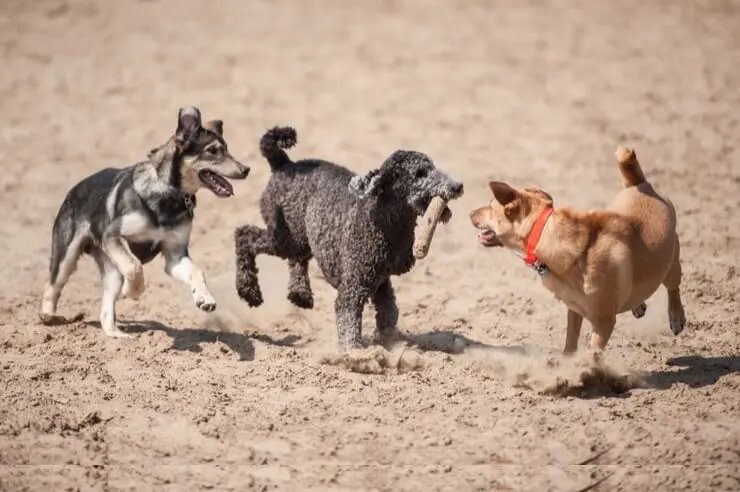
From Adobe Stock
The Husky Poodle Mix is a delightful breed, but like all dogs, they are prone to certain health issues. Being informed about these potential problems can help you provide the best possible care for your Husky Poo.
Hip Dysplasia
Hip dysplasia is a genetic condition commonly seen in larger breeds, and Husky Poos are no exception. This condition involves an improper formation of the hip joint, leading to pain, arthritis, and mobility issues. It’s particularly problematic for active dogs like the Husky Poo, as it can significantly impact their quality of life.
- Ensure regular vet check-ups for early detection.
- Maintain a healthy weight to minimize stress on joints.
- Consider joint supplements as recommended by your vet.
- Engage in gentle exercises to strengthen joint-supporting muscles.
Eye Problems
Eye conditions such as cataracts and progressive retinal atrophy are prevalent in Husky Poos. Cataracts can lead to cloudiness in the lens of the eye, potentially resulting in vision impairment or blindness. Progressive retinal atrophy is a degenerative disease that gradually deteriorates the retina, leading to eventual blindness.
- Keep up with regular veterinary eye exams.
- Watch for any signs of vision impairment or changes.
- Consult your vet immediately if you notice any eye issues.
- Provide a diet rich in nutrients that support eye health.
Skin Allergies
Skin allergies in Husky Poos can manifest as excessive itching, redness, and skin irritation. These allergies can be triggered by environmental allergens like pollen or dust, or by certain ingredients in their food. The discomfort caused by these allergies can be distressing for both the dog and the owner.
- Identify and avoid known allergens whenever possible.
- Give them nutritious food for allergies that can help alleviate symptoms
- Use hypoallergenic shampoos for sensitive skin.
- Opt for an allergy-friendly diet under veterinary guidance.
- Seek veterinary advice for appropriate treatments if allergies persist.
How to Train a Husky Poodle Mix
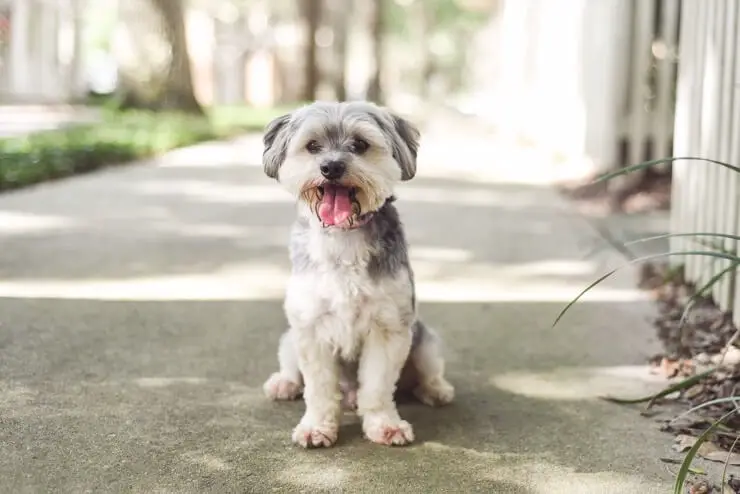
From Adobe Stock
Training a Huskypoo can be both a rewarding and challenging experience. These dogs are known for their sharp minds and independent streaks, making their training an exercise in patience and consistency.
You will need plenty of patience and understanding when educating your feisty friend – this is one of the most difficult breeds to train.
Establishing Leadership with Kindness
The Huskydoodle responds well to a leader who is firm yet kind. They require a trainer who establishes authority without using harsh methods. Positive reinforcement works wonders with this breed. They are more likely to follow commands when they associate training with pleasant experiences. Reward their good behavior with treats, praises, or playtime to encourage repetition of the desired actions.
Consistency is Key
Effective dog training requires a consistent approach. They benefit from a routine where commands, expectations, and consequences are clear and consistent. Inconsistent training can confuse them, leading to erratic behavior. Stick to a regular training schedule and use consistent commands to help your dog understand and follow your cues.
Tackling Stubborn Streaks
The Huskypoo can inherit a stubborn streak from the Siberian Husky side. There may be times when they seem to challenge your commands or test limits. During these moments, it’s important to remain calm and assertive. Reassert your commands without aggression or frustration. Patience and persistence will eventually win over their stubbornness.
Socialization and Exposure
Expose them to various environments, people, and other animals to help them develop into well-rounded dogs. This exposure reduces their anxiety in new situations and helps curb any potential aggressive tendencies. Regular walks in the park, visits to dog-friendly cafes, and playdates with other dogs are excellent ways to socialize your Husky Poo.
Mental Stimulation is as Important as Physical Exercise
Given their high intelligence, Husky Poos require mental stimulation to prevent boredom and destructive behavior. Incorporate training exercises that challenge their mind, like puzzle toys, obedience games, and agility training. Keeping their mind engaged is as crucial as keeping their body active.
Train with Love and Patience
Remember, training a Husky Poo, or any dog for that matter, is a journey filled with ups and downs. Approach it with love, patience, and understanding. Celebrate the small victories and be patient through the challenges. With the right approach and techniques, your Huskypoo will grow into a well-behaved and faithful companion.
The Cost of Owning a Husky Poodle Mix
Owning a Husky Poodle Mix, like any pet, is a long-term financial commitment that goes beyond the initial purchase price. As someone who’s navigated the world of dog ownership, I’ve seen firsthand the various costs associated with keeping a dog healthy and happy. Let’s break down the expenses you can expect when bringing a Huskypoo into your life.
Initial Costs: Bringing Your Huskydoodle Home
The initial cost of a Husky Poodle Mix can vary widely based on the breeder’s reputation, location, and the dog’s lineage. Generally, you might expect to pay anywhere from $500 to $2,000. This price often includes initial vaccinations, microchipping, and spaying or neutering.
Veterinary Care: Keeping Them Healthy
Regular veterinary care is essential for the well-being of your Husky Poo. This includes routine check-ups, vaccinations, flea and tick prevention, and unexpected health issues. Set aside approximately $500 – $1,000 annually for basic veterinary expenses. Additionally, consider the potential costs of treating any hereditary conditions common in Huskies and Poodles, such as hip dysplasia or eye problems.
Feeding Costs: Nutrition and Diet
A healthy diet is crucial for your Husky Poo’s overall health. High-quality dog food can cost around $30 – $70 per month, depending on the brand and your dog’s size and dietary needs. Also, consider the cost of treats and dietary supplements, if recommended by your vet.
Grooming Expenses: Maintaining Their Coat
Given their unique coats, Husky Poos require regular grooming. Professional grooming sessions can range from $50 to $100 per visit, depending on your location and the services required. Additionally, investing in grooming supplies for at-home care, such as brushes and shampoos, is a wise decision.
Training and Socialization: Building Good Behavior
Training classes are highly recommended, especially for a breed as intelligent and energetic as the Husky Poo. Group training classes can range from $50 to $200 for a series of sessions. Socialization and obedience training are crucial in the early stages of your dog’s life.
Miscellaneous Costs: Toys, Bedding, and More
Don’t forget the additional costs like toys, bedding, leashes, collars, and crates. These can add up but are essential for your Husky Poo’s comfort and safety. Set aside around $100 – $300 annually for these items.
Emergency Fund: Preparing for the Unexpected
It’s wise to have an emergency fund or consider pet insurance. Unexpected medical emergencies or health issues can be costly, and being financially prepared can alleviate a lot of stress.
FAQs on Husky Poodle Mixes
How long do Husky Poodle Mixes typically live?
On average, Husky Poodle Mixes have a lifespan of 10 to 13 years. Providing them with proper care, nutrition, and regular vet check-ups can contribute to a longer and healthier life.
Is the Husky Poodle Mix a good family dog?
This dog’s need for constant attention and stimulation makes it better suited for families than for single owners. However, be very careful if introducing one to a family with young children. If your child is mature enough to be patient when the pup gets pushy then the two of them should be able to learn to get along.
Do Husky Poodle Mixes bark a lot?
Husky Poodle Mixes can be vocal, as both parent breeds are known to vocalize. However, their barking tendencies can vary from individual to individual. Early training can help manage excessive barking.
Are Husky Poodle Mixes good for first-time dog owners?
While they are intelligent and trainable, Husky Poodle Mixes can be challenging for first-time dog owners due to their energy and independence. They may require experienced handling and consistent training.
Can Husky Poodle Mixes live in apartments?
Yes, Husky Poodle Mixes can adapt to apartment living if they receive sufficient exercise and mental stimulation. They are versatile dogs that can thrive in various living environments.
So, Is The Husky Poodle Mix the Right Dog For You?
In the end, your decision to welcome a Husky Poodle Mix into your life should revolve around your ability to meet their unique physical and mental needs. With the right environment and unwavering commitment, they can become cherished and loyal companions, filling your days with boundless energy and affection.
Who Is the Husky Poodle Mix For?
- Active Individuals and Families: If you lead an active lifestyle and seek a lively and sociable companion, the Husky Poodle Mix could be your perfect sidekick.
- Enthusiastic Dog Lovers: If you’re passionate about training, socializing, and engaging with your dog, the Husky Poodle Mix can thrive in a home filled with love and attention.
- Those Who Value Loyalty: This breed’s loyalty to their owners is unparalleled, making them devoted and affectionate family members.
Who Isn’t the Husky Poodle Mix For?
- First-Time Dog Owners: While they are intelligent and trainable, Husky Poodle Mixes can be a handful for beginners. Their energy levels and independence may require experienced handling.
- Sedentary Lifestyles: If your daily routine lacks opportunities for exercise and mental stimulation, this breed may not be the best match. They thrive on activity.
- Apartment Dwellers with Limited Space: Living in a small apartment without access to outdoor areas for exercise can be challenging for this active breed. They need room to roam.
More Siberian Husky and Poodle Mixes
Want a Siberian Husky mix or Poodle mix but aren’t keen on the Husky Poodle mix? Check out these other hybrid dog breeds:
Siberian Husky Mixes
- Australian Shepherd Husky Mix
- Pomeranian Husky
- German Shepherd Husky Mix
- Husky Lab Mix
- Husky Chow Mix
- Corgi Husky Mix
- Pitbull Husky Mix
- Golden Retriever Husky Mix
- Pitsky
- Pomsky
- Goberian

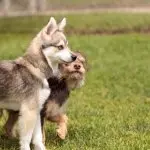
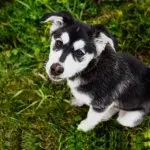

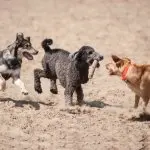
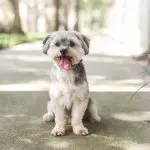
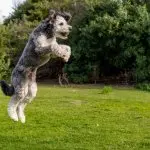



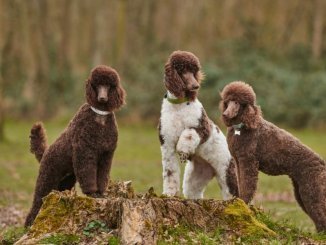
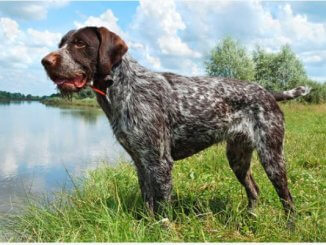
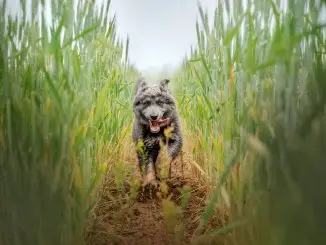
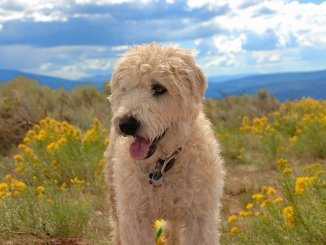
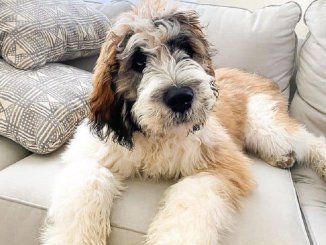
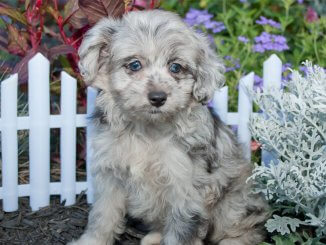
Be the first to comment